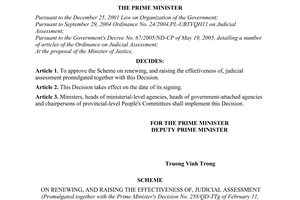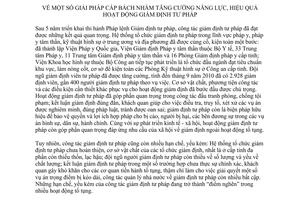Nội dung toàn văn Directive No. 1958/CT-TTg on a number of urgent measures to raise the capacity
|
THE PRIME MINISTER |
SOCIALIST
REPUBLIC OF VIET NAM |
|
No. 1958/CT-TTg |
Hanoi, October 25, 2010 |
DIRECTIVE
ON A NUMBER OF URGENT MEASURES TO RAISE THE CAPACITY AND EFFECTIVENESS OF JUDICIAL ASSESSMENT
After five years' implementation of the Ordinance on Judicial Assessment, the work of judicial assessment has recorded significant achievements. The system of judicial assessment institutions engaged in forensic medicine, forensic psychiatry and criminological techniques at central and local levels has been further consolidated and strengthened: the National Institute of Forensic Medicine, the Central Institute of Forensic Psychiatry of the Ministry of Health, 33 forensic medicine centers, 11 forensic psychiatry centers and 16 provincial-level forensic medicine divisions have been established; the Institute of Criminology of the Ministry of Public Security continues to be a leading institution up to regional standards and act as the core and foundation for strengthening criminological technique sections of provincial-level police departments. The pool of judicial assessors has been reinforced and reached a total of 2,928 by September 2010, including nearly 400 ad-hoc judicial assessors. Importance has been initially attached to physical foundations, working equipment and other necessary conditions for judicial assessment, which has made an important contribution crime prevention and combat activities; correct and objective assessment conclusions have facilitated the proper and lawful investigation, prosecution and adjudication, thus avoiding injustice. Judicial assessment has also served as an effective measure to protect lawful rights and interests of defendants, victims and parties involved in criminal, civil and administrative cases. In the context of socio-economic development, judicial assessment has also made an important contribution to meeting the social demand for extra-procedural assessment.
Yet, judicial assessment still saw many shortcomings and weaknesses: The system of judicial assessment institutions remains incomplete; physical foundations of assessment institutions, especially provincial-level ones, are inadequate and obsolete; the pool of judicial assessors remains quantitatively insufficient and qualitatively poor; judicial assessment conclusions were not entirely accurate and objective in some cases, causing difficulties to procedure-conducting agencies and even leading to delayed handling of some major cases; and the state management of judicial assessment remains unsatisfactory. These shortcomings and weaknesses have constituted a "bottle neck" in proceeding activities.
These shortcomings and weaknesses can be attributed largely to inadequate awareness of concerned authorities and sectors about the crucial position and role of judicial assessment; the implementation of the Ordinance on Judicial Assessment has not received due attention and many processes, regulations and documents guiding this Ordinance and Decree No. 67/2005/ ND-CP are slow to be promulgated; funding for and financial mechanism applicable to judicial assessment remain inappropriate; the focal agency assisting the Government in performing the state management of judicial assessment and agencies performing the state management of judicial assessment in specialized sectors have failed to bring into full play their roles and fulfill their responsibilities in managing judicial assessment activities.
In order to early tackle these shortcomings and weaknesses, contributing to remove the "bottle neck" in the work of judicial assessment, creating prerequisites for realizing the Project on renewal and raising of the effectiveness of judicial assessment approved by the Prime Minister in Decision No. 258/QD-TTg of February 11, 2010 (below referred to as Project 258), raising the quality and effectiveness of judicial assessment to meet requirements of proceeding activities and the social demand for judicial assessment in line with ongoing judicial and legal reforms, and contributing to the socioeconomic development, the Prime Minister requests ministers, heads of ministerial-level agencies and government-attached agencies and chairpersons of provincial-level People's Committees to concentrate efforts on organizing the performance of the following specific tasks:
1. Improving the awareness of concerned authorities and sectors about the position and role of judicial assessment:
Ministers, heads of ministerial-level agencies and government-attached agencies and chairpersons of provincial-level People's Committees should be clearly aware of the role and importance of judicial assessment to proceeding activities as well as the social life, and of their responsibilities to pay attention to and create conditions for judicial assessment activities in their sectors or localities; and concurrently continue organizing thorough study and wide dissemination of regulations on judicial assessment, thereby creating marked improvements in the awareness of authorities, sectors, cadres. Party members and people about the role and significance of judicial assessment, and elevating the status of judicial assessment in the process of judicial reform.
2. Consolidating and strengthening judicial assessment institutions and the pool of judicial assessors
a/ Consolidating and strengthening judicial assessment institutions:
- Within the ambit of their tasks and powers, the Ministry of Health, the Ministry of Public Security, the Ministry of National Defense and concerned ministries and sectors shall, in pursuance to the Ordinance on Judicial Assessment, the Government's Decree No. 67/ 2005/ND-CP and Project 258, consolidate and strengthen judicial assessment institutions under their management.
- The Ministry of Construction, the Ministry of Culture, Sports and Tourism, the Ministry of Natural Resources and Environment, the Ministry of Finance, other ministries and sectors and provincial-level People's Committees shall select and draw up lists of professional institutions which are professionally qualified and have sufficient physical foundations to perform judicial assessment in construction, finance-accounting, science and technique, culture and other sectors for posting on their websites and the website of the Ministry of Justice, creating favorable conditions for procedure-conducting agencies to solicit assessment upon request. This task should be completed before December 31, 2010, and these lists should be regularly updated.
b/ Raising the number and quality of judicial assessors:
Ministries, ministerial-level agencies, government-attached agencies and provincial-level People's Committees shall review and firmly grasp the number and quality of judicial assessors under their management; select and attract senior experts to act as judicial assessors and draw up lists of ad-hoc judicial assessors; provide more professional retraining and ethical improvement courses for judicial assessors; adopt appropriate policies to employ retired assessors who are highly qualified, physically fit and willing to take on assessment jobs, with a view to addressing the present storage of assessors. For the long term, it is necessary to take synchronous measures to create sources and raise the number and quality of judicial assessors.
3. Promulgating assessment processes and professional regulations on judicial assessment:
a/ The Ministry of Health shall assume the prime responsibility for, and coordinate with the Ministry of Justice and concerned ministries and sectors in, elaborating and promulgating assessment processes and professional regulations on assessment involving forensic medicine and forensic psychiatry.
b/ The Ministry of Construction shall assume the prime responsibility for, and coordinate with the Ministry of Justice in, elaborating and promulgating assessment processes and professional regulations on construction assessment.
c/ The Ministry of Public Security shall assume the prime responsibility for, and coordinate with the Ministry of National Defense and the Ministry of Justice in, elaborating and promulgating assessment processes and professional regulations on assessment involving criminological techniques.
d/ The Ministry of Finance shall assume the prime responsibility for, and coordinate with the Ministry of Justice in, elaborating and promulgating assessment processes and professional regulations on financial-accounting assessment.
e/ For environmental protection, forest, land, petrol and oil, securities, banking and other sectors subject to assessment, ministers and heads of sectors shall consider and decide to promulgate assessment processes and professional regulations applicable to each judicial assessment activity in each sector or guide the application of general professional processes and regulations of such sectors.
The promulgation of assessment processes and professional regulations specified in this Section shall be completed before June 30, 2011.
4. Elaborating and promulgating a table of health loss rates for use in forensic medicine:
The Ministry of Health shall assume the prime responsibility for, and coordinate with the Ministry of Justice, the Ministry of Public Security, the Ministry of National Defense and concerned ministries and sectors in, elaborating and promulgating a table of health loss rates for use in forensic medicine.
Such a table shall be promulgated before December 31, 2010.
5. Elaborating and promulgating judicial assessment charges:
a/ The Ministry of Health, the Ministry of Public Security, the Ministry of Construction and other line ministries and authorities shall expeditiously elaborate schemes on collection of judicial assessment charges according to requirements and particular characteristics of sectors under their management, then propose them to the Ministry of Finance for promulgation.
b/ The Ministry of Finance shall guide and urge the Ministry of Health, the Ministry of Public Security, the Ministry of Construction and other line ministries and authorities in elaborating schemes on collection of judicial assessment charges; and promulgate circulars on judicial assessment charges in different assessment areas at the request of these ministries and authorities.
c/ The Ministry of Finance shall elaborate and issue a circular on judicial assessment charge in the finance-accounting sector.
The elaboration and issuance of circulars on judicial assessment charges specified in this Section shall be completed before December 31. 2010.
6. Issuing a circular guiding the provision of assessment services at the request of individuals and institutions:
The Ministry of Justice shall coordinate with the Ministry of Finance, the Ministry of Health, the Ministry of Public Security, the Ministry of National Defense and concerned ministries and sectors in elaborating and issuing a circular guiding the provision of assessment services at the request of individuals and institutions defined in Article 23 of the Government's Decree No. 67/2005/ND CP.
This task shall be completed before June 30, 2011.
7. Assuring physical foundations and funds for judicial assessment activities:
a/ The Ministry of Finance shall study and propose the formation of a separate budget expenditure item to fund the solicitation and performance of assessment in criminal procedures, assure funds for and guide ministries, sectors and localities in seriously conducting the estimation and allocation of regular funds for proper, full and timely payment of assessment expenses and allowances for judicial assessors under the Prime Minister's Decision No. 74/2009/QD-TTg of May 7, 2009; put an end to the delayed payment of assessment expenses and allowances for assessors in the first quarter of 2011.
b/ The Ministry of Health, the Ministry of Public Security, the Ministry of National Defense and provincial-level People's Committees shall prioritize investment in building adequate physical foundations, scientific equipment and devices and assuring other material conditions for assessment institutions under their management.
8. Enhancing the state management of judicial assessment:
The Ministry of Justice shall assume the prime responsibility for, and coordinate with other ministries and sectors in, enhancing the state management of judicial assessment, studying and proposing a renewed mechanism for state management of judicial assessment, thereby assuring the synchronous, effective and practical state management and addressing existing shortcomings, weaknesses and inadequacies of the state management of judicial assessment. Ministers and heads of sectors shall promptly assign units to act as focal points to assist their ministries and sectors in managing the judicial assessment in the sectors under their management. Ministries and sectors that have no specialized units in charge of judicial assessment shall assign their legal sections to act as focal points.
9. Studying and drafting a Law on Judicial Assessment:
The Ministry of Justice shall assume the prime responsibility for, and coordinate with other ministries, sectors, the Supreme People's Court and the Supreme People's Procuracy in, expeditiously studying and drafting a Law on Judicial Assessment for submission to the competent authorities for examination and promulgation, thereby creating high and uniform legal bases consistent with the system of procedure laws and addressing as soon as possible institutional inadequacies of judicial assessment. The Law on Judicial Assessment should be studied and drafted in the direction of stepping up the socialization of assessment, guaranteeing the right of litigants to request assessment, adopting mechanisms to assure the objectivity and transparency of assessment, guaranteeing that assessment conclusions can serve as an important source of proof for testifying the objective facts of criminal, civil and administrative cases, and intensifying assessment services to meet the demand of the society and people for extra-procedural assessment.
10. Organizing the implementation of Project 258:
Within the ambit of their tasks and powers, ministers, heads of sectors and chairpersons of provincial-level People's Committees shall expeditiously organize the thorough study and work out plans on implementation of Project 258, and assure the quality and effective implementation of this Project according to the set schedule and their assigned functions and tasks, thereby creating a practical progress in judicial assessment right in 2011.
11. Ministers, heads of ministerial-level agencies and government-attached agencies, and chairpersons of provincial-level People's Committees shall implement this Directive.
The Supreme People's Court and the Supreme People's Procuracy shall coordinate with concerned ministries and sectors in performing the tasks specified in this Directive.
The Minister of Justice shall urge, inspect and annually review the implementation of this Directive, and conduct in the fourth quarter of 2013 a final review and appraisal of results of the implementation of this Directive, then report them to the Prime Minister.
This Directive takes effect on the date of its signing.
|
|
PRIME MINISTER |


